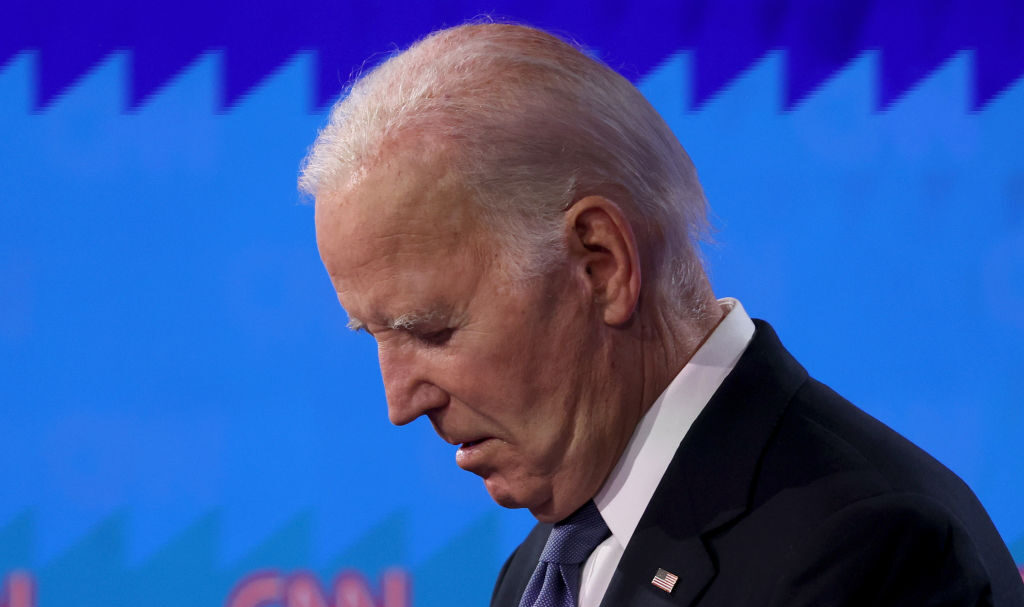Will Trump’s Foreign Policy Mirror Biden’s Blunders?
The U.S. is weaker and less secure after four years of Democratic government. Will anything change?

The Biden era is ending. The Trump era is arriving. The shift will not be from intervention to isolation, but from one form of intervention to another. The results are unlikely to be much better.
President Joe Biden’s term is coming to a desultory conclusion, as he dodders around the White House babbling about how he would have defeated Donald Trump last November. Many of Biden’s greatest failures have come overseas, despite his apparent conviction that he is another Bismarck, Metternich, or even greater, knowing “more world leaders than any” of his listeners. Yet Biden fails the famous Reagan campaign test: Are Americans better off than four years ago?
There is war in Europe, war in the Middle East, potential war in Asia. The U.S. is deeply involved in all three. As senator, vice president, and president, Biden has literally spent a lifetime promoting American meddling around the globe. To him, no foreign controversy was too small for Washington’s attention. His overriding objective was to make the rest of the world ever more dependent on the U.S., constantly “reassuring” friends, partners, allies, and more that the U.S. would always be there, no matter how little they did for themselves and much they did to others.
As president his worst performance has been in Europe, with his most grievous mistakes promoting NATO membership for both Georgia and Ukraine and refusing to negotiate with Russia’s Vladimir Putin before the invasion of Ukraine. Although Moscow should not have threatened war, it responded to decades of reckless deceit by Washington and European governments. Allied capitals eased the Soviet Union’s collapse by promising both the Gorbachev and Yeltsin governments not to expand NATO eastward. The Clinton administration tossed these pledges aside, treating the Russian Federation as a defeated foe, and further antagonized the Russian people as well as government by turning the transatlantic alliance into an offensive weapon to dismantle Yugoslavia.
Putin denounced these tactics in his famous 2007 address to the Munich Security Conference. The following year US officials warned the Dubya administration that pushing Ukrainian membership in NATO risked Russian retaliation. In 2014 the U.S. and Europe supported a street putsch against the elected Ukrainian president, putting Russia’s Black Sea base in Sevastopol at risk. As NATO countries tightened their embrace of Ukraine despite dithering over formal membership, in late 2021 Moscow threatened war and sought a diplomatic modus vivendi. Blissfully lost in his own fantasies, Biden underestimated Putin.
The invasion was a criminal act, but blame is widely shared. The cost was terrible. The proxy war launched by Washington and European governments has ensnared America in a conflict not its own and continues to risk expansion and escalation. Russia isn’t likely to chance full-scale war with NATO as long as it believes it is winning, but an accident or error could bring on the global conflict that no sane person desires. Biden’s hapless policy has been to hope that the Russian economy collapses before the Ukrainian army does.
If there is a silver lining to this war, it is that the Europeans feel pressure to do more with their militaries. Yet that is but half the equation. The U.S. also must do less for Europe. Otherwise, they will never do enough. Eight decades after the conclusion of the Second World War, the prosperous and populous continent remains embarrassingly weak militarily. Even Great Britain continues to shrink its army while the German Bundeswehr’s status is a genuine scandal, with a new report suggesting that at the current rate Berlin will need a century to deploy a genuine deterrent force.
The Biden approach—begging the Europeans to do more while for decades reassuring them that, even if they don’t, the U.S. will still do everything—was little short of idiotic. The Trump approach, badgering and insulting them while continuing to do more, also fell short. Instead of lecturing European governments about what they should do, the U.S. should begin withdrawing forces and tell its allies what it plans to do: By a certain date, turn over responsibility for the continent’s security. The U.S. should work to make a smooth transition, but what they ultimately do and how much they ultimately spend would be up to them. The sooner Washington started, the easier the handoff would be.
By most measures, American policy in the Middle East is even more incompetent and counterproductive than in Europe. The only good news is that Washington does not there face a nuclear-armed great power and thus is not at risk of ending up at war with one. In fact, the Iraq invasion demonstrated that America is largely insulated from its Mideast mistakes. With Biden’s support as a senator, the U.S. blew up Iraq, spawning brutal insurgents and terrorists, causing hundreds of thousands of civilian deaths, and setting fire to the entire region. Yet the impact on the American homeland was minimal. Money was squandered and lives were lost, but most Americans seemed to barely notice.
Unfortunately, President Biden has reinforced the mistakes of his predecessors, treating the U.S. as the indispensable power required to protect everyone else. Such is the naval and air war against Yemen, with Washington shielding other nations’ shipping. Better would have been to use American leverage in pressing for a ceasefire in Gaza, the objective of Yemen’s de facto government.
Elsewhere the administration has openly turned U.S. policy over to Israel and Saudi Arabia, thereby putting the interests of foreign governments before those of the American people. While posturing in support of a ceasefire in Gaza, the Biden administration provided Israel with the weapons to kill Palestinian civilians prodigiously—at last count an astonishing 64,260. While the administration recognized that the violent depredations of Israeli settlers in the West Bank was intolerable, it did nothing meaningful in response. By treating Palestinians as second-class human beings, Israel continues to make more violence inevitable. As well as additional blowback against America.
In contrast, Biden promised to treat Crown Prince Mohammed bin Salman as “a pariah” after his minions murdered and dismembered Jamal Khashoggi, a critical journalist and American resident. But the president soon turned craven, visiting the Kingdom, where he obsequiously, though unsuccessfully, begged MbS, as the killer prince is known, for expanded oil sales. Since then, Biden has pushed to trade Saudi recognition of Israel, which does not benefit America, for a U.S. commitment to defend the royal regime. Offering to turn America’s military into a janissary corps and make the Mideast safe for absolute monarchy is grotesque by any standard.
The Biden administration also failed to engage Iran. In his first term Trump foolishly withdrew from the JCPOA, the agreement restraining Tehran from seeking nuclear weapons. That empowered Iran’s radicals and spurred the advance toward nuclear weapons. Despite his criticism of Trump’s recklessness, Biden pursued the same course. Israel’s recent military strikes have left Tehran more vulnerable to military coercion, which, paradoxically, makes Tehran’s race to develop nuclear weapons more likely.
Yet, with or without nukes, Iran does not threaten the U.S. Washington is confronting Tehran on behalf of Israel. For all its religious posturing, Iran’s rulers are pragmatic despots focused on money and power. Absent the nearby U.S. military presence, backed by years of military threats, Tehran would pay little attention to America.
Then there is Asia. The good news is that Biden ended Washington’s involvement in Afghanistan, though the withdrawal was badly managed, and there is no other hot war presently drawing the U.S. in. Nor does much there directly threaten the U.S. The bad news is that unnecessary Asian commitments risk conflict, and, if one erupts with nuclear-armed North Korea or China, the results could prove catastrophic.
Americans are entangled on the Korean peninsula more than seven decades after the last war, even though the Republic of Korea has more than 50 times the GDP and twice the population of its antagonist, North Korea. The latter is not interested in war with America but is preparing for one since the U.S. maintains 28,500 personnel in the South and regularly threatens to unleash the American military on the Democratic People’s Republic of Korea. Biden has shown even less interest in Asia than in Europe in shifting defense responsibilities to allies.
One of Trump’s most successful foreign policy initiatives was engaging the DPRK’s Kim Jong Un. Although negotiations broke down in Hanoi, Trump showed creativity and courage in trying a new approach. Biden returned to the policy of old, refusing to consider shifting to arms control in an attempt to promote dialogue. As a result, the North is busily adding nuclear warheads and improving missiles, with the objective of targeting American cities. At the same time the South is in political crisis, after the hard-right president so intensely flattered by Biden attempted an autogolpe, which will likely trigger an election that brings the left to power.
The People’s Republic of China also does not want war with America. Rather, it desires what America has, domination of its own neighborhood. Nevertheless, Asia is filled with potentially formidable powers that could do much more to deter Chinese coercion. Most vulnerable is Taiwan, whose people have been reluctant to arm themselves, preferring to rely on the U.S. Although they are democratic friends, America has no reason to go to war on their behalf, especially against a serious, nuclear-armed power which views the issue as existential. Nevertheless, Biden repeatedly declared that he would fight over the island, a promise his aides in some confusion just as repeatedly repudiated.
Biden also has treated the Philippines, with a navy that barely sails and air force that barely flies, as a vital ally. The administration recklessly committed America to defend worthless, disputed territory claimed by Manila, which could also put Washington at war with Beijing. That would be catastrophic: What interest involving the Philippines is so vital that it warrants such a commitment?
Overall, the administration has done little in Asia to promote self-sufficiency among friendly and allied states, which would allow the U.S. to back away as an offshore balancer, available to help in an emergency while expecting others to do the heavy lifting on their own behalf. Especially foolish was Biden’s adoption of Trump’s protectionist stance, discouraging trade with Asian states, which could help build regional counterweights to the PRC.
In a few days Biden will be a former president. For weeks he has been effectively gone. Since the election foreign leaders have made their pilgrimages to Mar-a-Lago, not the White House. Thus ends one of the longest, but least venerable, careers in Washington. Joe Biden can’t even say he kept us out of war, with the U.S. battling Yemen’s Ansar Allah movement. Because of Biden’s policies America is less secure than four years ago. We must hope that the same will not be said when Donald Trump finishes his term four years from now.
The post Will Trump’s Foreign Policy Mirror Biden’s Blunders? appeared first on The American Conservative.

